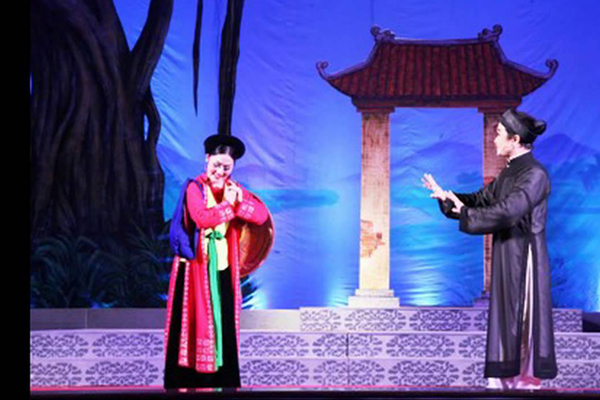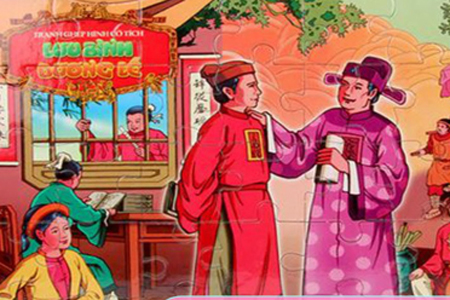The man-wife-lover relationship, through a common subject for literature in the West, was rarely talked about in ancient Vietnam where family ethics was firmly governed by Confucianist edicts. One exception was the story of Luu Binh and Duong Le which was made into a very popular Cheo play.
Luu Binh and Duong Le were classmates. At one of those examinations held every three years Duong Le, the plodder, passed and made a mandarin.
Luu Binh who had devoted himself more to pleasure than to academic pursuit, failed and fell into the clutch of poverty. At the end of his tether, Luu Binh came to his friend for help but was received coldly and was given just a few bowls of moldy rice to go with a couple of rotten pickled aubergines.

Humiliated, he went away. Then luck smiled on him: he ran into a beautiful young woman, Chau Long, who said she was willing to take care of him to give him another chance. Chau Long also made clear that any intimacy would be out of the question unless Luu Binh succeeded at the next exams.
Luu Binh studied very hard and passed but when he came home break the good news to Chau Long, he found to his great disappointment that she had left never to return.
A heart-broken and vengeful Luu Binh went to Duong Le with the intent of giving his old friend a piece of his mind. But he confounded when he came face to face not only with Duong Le, but also with his wife, Chau Long, and was told that the humiliating treatment he had been given was designed to prick his ego and that Chau Long had come to help him.
For more than two hundred years in northern Vietnam, "Luu Binh and Duong Le" had been played, to full "courts” — courts because Cheo, a folk opera originating in the delta of the Red River, is normally played not indoors but in the open, in the forecourt of a communal house.
This genre of performance art was first developed in the 11th century. It matured in the 15th and 16th centuries to reach its peak in the 17th and 18th centuries along- side the emergence of many popular stories written in Nom, a demotic script invented to replace the Chinese system of writing.
Cheo most often depicts the sad fate of women under the feudal system. The jokes cracked by the jester echo the populace’s sarcastic laughs at the system of mandarins and notables. The language and scenery are symbolic and conventional. The mat which serves as the stage can be supposed to be either the ground, the sky, a river or a mountain. The effect of distancing (Brecht’s Entfremdung) is produced by the questions and answers exchanged between players and spectators. Watching a Cheo play one would think of a modern "happening". In the towns, Cheo has been modernised to better adapt itself to the closed space of a theatre.
In the countryside Cheo remains the chief attraction at village festivals. Men and women, the young and the old will rush to the commuital house, their hearts aflutter, as soon as the first sounds of the Cheo drum are heard.



